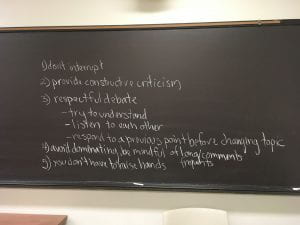As you prepare for another Spring quarter of online teaching and learning, you may find yourself in need of some additional technology to fulfill course needs or simply diversify your online teaching experience and your students’ online learning experience. Consider UChicago Voices.
UChicago Voices is a self-service web platform built on WordPress content management tools. With these tools, you can create a website with more flexibility than what Canvas offers for portfolios, course blogs, and more.
UChicago Voices allows for students to create blog-style postings with capabilities for additional formatting, adding photos, videos, and other media to make their work more engaging. Academic Technology Solutions (ATS) has an excellent blog post about how to use course blogs as a write-to-learn exercise.
As a University-supported service, you can get guidance from Remote Humanities’ Online Pedagogy Assistants (OPAs) and instruction from ATS for additional support through workshops and virtual office hours.
If this sounds interesting, start by asking yourself, Is Voices Right for Me?
In the process of thinking about a course website, it’s important to think about the accessibility of your website for students. If you’re interested in learning more about creating accessible online classrooms, begin with the ATS workshop, “Creating Inclusive and Accessible Learning Environments.”
If you’re interested in a deeper dive into digital accessibility, you can look to some vital resources provided by the Center for Digital Accessibility (CDA).
To get started, the CDA outlines in-depth the following four-step approach to the process of increasing web accessibility:
- Awareness: What are accessibility principles and guidelines?
- Assessment: How does your website currently meet those guidelines?
- Remediation: How are you going to address areas that do not meet those guidelines?
- Iteration: Update check! Does my website still meet the guidelines, or does more remediation need to take place?
As noted on the CDA website, the University of Chicago adheres to the international standards of the World Wide Web Consortium’s (W3C) Web Content Accessibility Guidelines version 2.1, Level AA (WCAG 2.1, Level AA), which are best practices for public-facing websites. These guidelines are organized according to the four principles of accessibility which maintain that web content must be perceivable, operable, understandable, and robust. Each principle is divided into testable success criteria.
The CDA website is full of various guides and tools for increasing your awareness, conducting your assessment, and implementing your remediation in this process. In addition, you can contact the CDA if you have any further questions about trainings, resources, and requesting consultations.
If there’s an app that you’d like to see covered in the Technology Rundown, please feel free to submit suggestions to me, Brandy C. Williams [brandycwilliams@uchicago.edu]. Other resources available from Remote Humanities include other informative posts, including interviews with faculty, and the Online Pedagogy Assistant (OPA) Program (and meet the OPAs).


